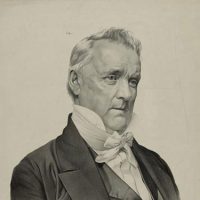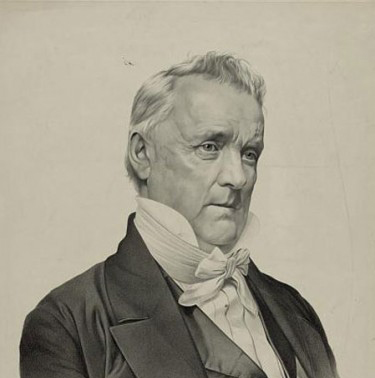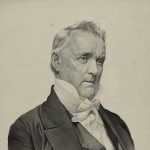Commentary by Jonathan Matthes
If I asked you who you thought the best president was, most of you would likely say Abraham Lincoln or George Washington. I’m not going to argue with you. Lincoln and Washington did amazing things, uttered profound sayings, have prominent monuments in Washington and have their birthdays celebrated every year.
If they are the gold standard, then the standard is well-represented.

If I asked you who you thought the best president was, practically none of you would say James Buchanan. He was both the immediate predecessor to Lincoln and almost routinely rated as the worst president in history. And for good reason.
Why was he so bad?
To help with this I called up Robert Strauss, who wrote a book about the worst presidents ever, called “Worst. President. Ever.” And we pow wowed.
“Most people can say they want to be the next Washington, Lincoln or Roosevelt, but those situations are unlikely. For instance, the next president isn’t likely founding a new nation or facing civil war or a world war,” Strauss mused. “But everyone can aspire to be better than Buchanan.”
So what happened under Buchanan that went so poorly?
In short, everything.
He convinced a few of the northern Supreme Court justices to vote along with the five Southerners to rule against Dred Scott in the landmark Dred Scott case, which declared the children of former slaves non-citizens and made it harder for the nation to regulate slavery.
The Court was made up of five southerners, who were going to vote against Scott, and four northerners, who were most likely going to vote in his favor, which Buchanan thought would increase the divide between the north and south. So he convinced some northern justices to go along with the southerners to show bipartisan support.
Buchanan had good intentions, I guess, but they egregiously backfired, further dividing the nation. Dred Scott vs. Sandford would go down as one of the Supreme Court’s most regrettable decisions.
Speaking of slavery, Buchanan believed its legality should be left up to individual states, as happened in Kansas.
Buchanan backed Kansas determining its slave status by referendum. That might make sense in a Utopian dream, but it sparked “Bleeding Kansas,” But it sparked “Bleeding Kansas,” violent statewide confrontations between pro- and anti-slavery factions.
One of the anti-slavery heroes, John Brown — who murdered a lot of people — then went to Harper’s Fairy, Va., to start a slave revolt by commandeering an armory. Buchanan wasn’t going to do anything about it until Robert E. Lee, then a captain in the U.S. Army, reminded him that Harper’s Ferry was just up the Potomac from Washington, D.C., and that a violent revolt could easily drift down the river to the nation’s capital.
This is the theme for Buchanan, division. As Strauss put it, “As president, Buchanan chose the wrong path at every fork in the road.” He had Congress pass a tariff that tamped down manufacturing at a time when the north’s economy was becoming more manufacturing-dependent, which helped create a crippling recession.
His entire presidency was marred with division. At almost every turn, he’d inadvertently sow more of it.
In fairness, the table wasn’t set up well for Buchanan. Franklin Pierce’s presidency was a disaster, so Buchanan didn’t inherit an ideal situation.
His presidency began with the nation on the brink of civil war. When he left office, six states had seceded from the Union. And he believed that, he, as sresident, was powerless to stop them.
So, this makes me wonder: What are the traits that made Buchanan such a forgettable president? I think it’s a fair question.
Maybe Buchanan just lacked experience?
Nope. Buchanan might have had the most impressive resume of any president ever. He served five terms in the U.S. House of Representatives and nearly a decade in the Senate. He was a secretary of state and an ambassador to Russia and Great Britain. He also had experience running for president. He was elected on his fourth try. The man did it all. Few have ever been so qualified.
Well, that rules out inexperience. So maybe he was too introverted and didn’t connect well with others?
Nope. Buchanan was the only bachelor president and lived like it. He was the life of every party and loved throwing them. He was a good dancer, could carry conversation with ease, and was well-liked by almost everyone.
OK, well, how decisive was he?
Now we are on to something. Buchanan wasn’t a decisive person.
That’s not always a bad thing. Being the good guy who doesn’t have to make firm decisions helps when you’re trying to build relationships in foreign courts or in the halls of Congress — a skill Buchanan mastered.
But as president firm decision-making is essential when you have to lead in the face of crisis.
Look at those pinnacle presidents. George Washington had to hold the nation together through its volatile infancy. Andrew Jackson held the nation together by the force of shear will on two occasions — first as a general at the end of the War of 1812, the second president when South Carolina tried to secede. Abraham Lincoln and Franklin Roosevelt guided the nation through climatic wars. Theodore Roosevelt and Ronald Reagan put a bold face on America, believing that the U.S. should be a global leader that doesn’t back down from foreign powers.
All six of those presidents shared a similar trait: they were decisive.
When challenges presented themselves, those six held their ground.
Buchanan did not.
Memory can be an interesting judge. Buchanan and Lincoln faced a similar problem. The nation was dissolving before them. They faced the same crisis. But Lincoln succeeded where Buchanan failed.
What was the difference?
The difference was that the nation came together under Lincoln and fell apart under Buchanan.
We rate our best presidents as best presidents because they have success. They have tangible accomplishments. But how would we remember our favorite presidents if those accomplishments never happened?
Take Lincoln, for example. Most say he’s the greatest president of them all. I don’t disagree.
We forget, though, that he was massively unpopular during his first term as president. His reelection was in serious doubt, especially with his opponent promising peace with the South. The Confederacy would have been its own nation. The Civil War would have ended with a defeated Union.
What saved Lincoln was the Battle of Gettysburg in July of 1863. After the federals’ victory, momentum shifted the Union’s way and people began to believe that there might be an end to the war on the horizon. In November of 1864, Lincoln would win reelection in a landslide.
But what if Gettysburg didn’t happen?
What if Lincoln didn’t win reelection and the South became its own country?
How would you remember him today?
Special thanks to:
Robert Strauss. Author of Worst. President. Ever.
Howard Witt and the Miller Center of Public Affairs, University of Virginia
Pari Arnold, Professor the University of Notre Dame
Lillian Cunningham, the Washington Post and the “Presidential” Podcast








